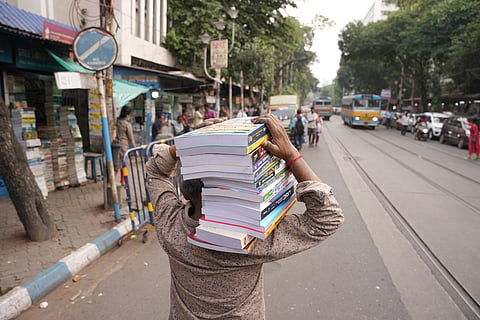
- LIFESTYLE
- FASHION
- FOOD
- ENTERTAINMENT
- EVENTS
- CULTURE
- VIDEOS
- WEB STORIES
- GALLERIES
- GADGETS
- CAR & BIKE
- SOCIETY
- TRAVEL
- NORTH EAST
- INDULGE CONNECT

Post October festivities, on a Monday around noon, College Street presented an unlikely picture. Kolkata’s iconic locality, Boi Para, as we lovingly call it, is usually thronged by college students browsing through text books, or children— along with their parents—dashing from one shop to another in quest of right reference books and test papers, or just bibliophiles looking out for newly released or rare books. But on that particular day of our visit, the bustling neighbourhood wore a relatively deserted look, devoid of buyers jostling for the best rates.
This sorry state of the locality had us wondering about the reason behind the lull. Was it just a dull day? Was it because of the growing dominance of online shopping? Was it the depleting number of readers over the years, or was it the cool comfort of air-conditioned book shops in shopping malls that has driven away a majority of the book-loving crowd?
As we went around seeking the truth, Pijush Kanti Talukdar, owner at Gyanjyoti Book rust, tells us that online retail has indeed taken away a major chunk of buyers from the bylanes of College Street. “Since we sell textbooks, we can say with authority that buying books for studies has almost become obsolete. here was a time, when apart from the regular textbooks, students used to buy 2 to 3 reference books. But now they are not even keen on reading their textbooks, let alone reference books,” rues Pijush.
Echoing Pijush’s observations, Arabinda Das Gupta, a fifth generation owner of a 137-year-old book store called Das Gupta And Company, avers, “We survived both the World Wars and even the Naxalite movements, but we haven’t faced a threat bigger than the deadly concoction of lack of reading habit and online retail.”
Unlike most other book store owners who refrained from commenting, Arabinda adds, “We could recover fully from wars and political upheavals, but not from this one, mainly because of the way the multinational companies are devouring us. People may wonder why are we still in the business? That’s because switching over to something else is not easy at this point. We are fairly a well established business now, with so many employees...we cannot just shut down one fine day. We will continue to fight even if our revenues go down. Also, rampant piracy has stoked the worsening situation further—neither the authors are receiving any royalty, nor the booksellers are earning any revenue. There were almost eight bookstores, between Phoolbagan and airport, but now there are none. In South Kolkata too, there were a few bookstores, which have closed down. Now, those in College Street too, are struggling.” laments Arabinda, who recently started a free library upstairs for like-minded people or needy students to read books of their choice or take notes.
“Previously, managing the store during special occasions used to be so difficult, with people thronging the shop for books to gift their loved ones. hat practice is almost dead now. Instead, we witness students selling off their reading materials the same day they finish writing their exams,” he concludes. Despite these difficulties, Jayanta Das from Signet book shop and Taraknath Mondal from Mondal book shop are not yet ready to feel disappointed. “There is still a demand for books, especially engali ones among engalis expats. People from the city may have given up on their reading habits, but that’s not generic. We still get Bengalis from Bangladesh and other parts of the world browsing through and buying books worth thousands,” informs Jayanta.
“I have a customer from New Zealand. Everytime he visits, he buys books for a little community library for his fellow Bengali residents to nurture reading habits in their mother tongue. Also, though a variety of English books are available online, one has to visit College Street to get Bengali books, and books specialising in art, theatre, cinema, music and such,” he adds.
Taraknath tells us there’s also a rise in demand for religious texts and mythological stories, especially around the festive season. People travel all the way from Malda, Bankura, and other districts to buy these books. “But yes, the business has gone down. All we can do is keep our hopes high for the times to get better,” concludes Taraknath. In an age of rapid digitisation, and steadily dwindling attention span stoked by social media, all we have is a flickering hope that the printed words continue to be our window to the world.